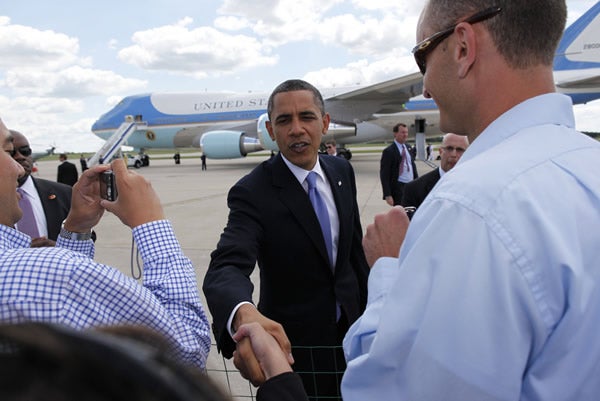President Barack Obama visited a federally funded advanced battery plant in Holland, Michigan, today to tout the success of his green jobs initiative. But there’s another highly touted green company in Michigan that the President didn’t visit—and with good reason.
About 170 miles away in Oak Park, Michigan, the state-government-funded hybrid bus company Fisher Coachworks sits dormant. It’s out of business just two years after it drew acclaim for being part of Michigan’s green future, despite millions in state taxpayer funding and a contract to sell buses to be purchased with federal taxpayer dollars. Michigan Capitol Confidential reports:
The Daily Signal depends on the support of readers like you. Donate now
In September of 2009, Fisher Coachworks was mentioned in a press release from Gov. Jennifer Granholm as a “green technology” company that was part of the “new energy economy for Michigan.” Two years later, the state says Fisher Coachworks is out of business and the state has to write off $1.6 million it loaned the electric bus manufacturing company.
Edgar Benning, general manager of Flint’s Mass Transportation Authority, said in an email that Fisher Coachworks went out of business in the development phase of making two $1.1 million electric buses that Flint was going to purchase with grants from the American Recovery and Reinvestment Act, commonly referred to as the “stimulus plan.”
It turns out that the company failed to meet two performance “milestones” as part of its $2.6 million total loan agreement with the state—and without government funding, the company couldn’t survive.
Fisher Coachworks isn’t the only green company that has struggled to make ends meet amid Obama’s green initiative. In testimony before Congress, Heritage’s David Kreutzer cited four examples of companies that received millions in federal loan guarantees for clean energy projects—three of which ultimately struggled to secure private financing. Why? They weren’t commercially viable.
Unfortunately, though, politicians like President Obama believe that they can substitute their judgment—and taxpayer dollars—for the mechanics of the market. Kreutzer explains why that just doesn’t work:
When the savings of new, more energy-efficient technologies exceed the costs of adopting those technologies, markets have the incentive to adopt them.
But it is the voluntary participants in these market transactions that best know the full spectrum of the costs and benefits that matter most to them. While engineers, accountants, technicians, and others might help to inform consumers and producers, no number of green eyeshades, calculators, and lab equipment can substitute for a consumer’s or firm owner’s own determination of value.
In other words, Kreutzer says, policies mandating energy technologies that markets resist will only serve to dry up national income while slowing economic growth that generates good, viable jobs.
Those failures, though, haven’t stopped the President from making his sales pitch. He declares victory where there is failure, and he gives his Administration full credit:
What also made this possible are the actions that we took together, as a nation, through our government. The fact that we were willing to invest in the research and technology that holds so much promise for jobs and growth. The fact that we worked together to create the environment like this where green businesses can prosper.
That sure sounds good, if only it were true.
































